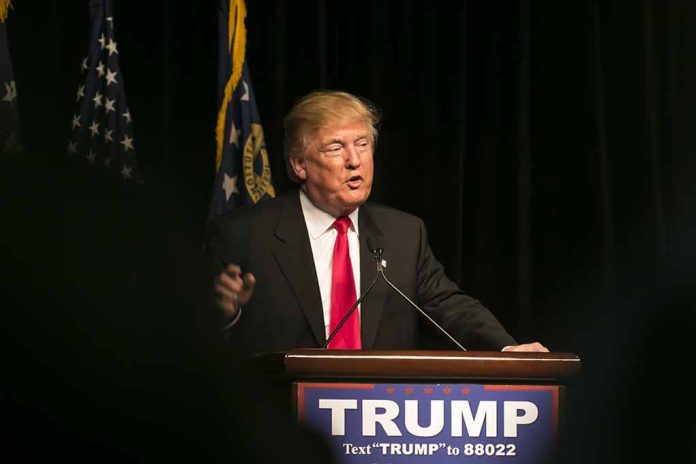
Trump’s plan to end remote work for federal employees sparks fierce union opposition and legal challenges.
At a Glance
- Trump vows to end remote work for federal employees, challenging a 2029 telework agreement
- Unions prepare to fight back, citing existing contracts and improved efficiency
- Trump’s advisers claim ending remote work could save $2 trillion and reduce the federal workforce
- Legal and logistical hurdles may complicate implementation of return-to-office mandate
- Debate highlights broader cultural divide over workplace flexibility post-pandemic
Trump’s Return-to-Office Mandate Faces Strong Opposition
President elect Donald Trump’s administration is encountering significant resistance over its directive for federal employees to return to conventional office settings. The move aims to phase out pandemic-era telework practices, but it has ignited a fierce debate over workplace flexibility and government efficiency.
The American Federation of Government Employees (AFGE), representing a substantial portion of federal workers, has vowed to oppose any attempts to block the Biden administration’s agreement allowing remote work until 2029. This sets the stage for a potentially protracted legal battle.
Legal and Logistical Challenges
Trump’s plan faces considerable legal hurdles. Many federal employees’ contracts, established under previous administrations, affirm telework as a right. Additionally, the General Services Administration has been reducing office space, complicating a full return to pre-pandemic office policies.
“It’s in a lot of labor contracts, And at a lot of these agencies, the reality is, they don’t have the place to put people to force them back five days a week.” – Cathie McQuiston
Approximately 56% of the civil service is covered by collective bargaining contracts that often include telework options. This widespread adoption of flexible work arrangements presents a significant obstacle to Trump’s proposed policy shift.
Trump’s Stance and Advisers’ Claims
Trump has been unequivocal in his criticism of the current telework arrangements, calling the agreement “very terrible” and vowing to challenge it in court. His position is clear:
“If people don’t come back to work, come back into the office, they’re going to be dismissed, and somebody in the Biden administration gave a five-year waiver of that, so that for five years people don’t have to come back into the office” – Trump
Trump’s advisers, including Vivek Ramaswamy and Elon Musk, argue that ending remote work could lead to significant cost savings and increased efficiency. They suggest that requiring in-office work could result in voluntary terminations, potentially reducing the federal workforce.
President-elect Donald Trump’s plan to have all federal employees return to their offices full-time could already be hitting a snag thanks to a union deal.https://t.co/hML7iCiWHT
— WSBT (@WSBT) December 5, 2024
Union Defense and Counterarguments
AFGE National President Everett Kelley has staunchly defended the telework protections, emphasizing the benefits of remote work for government efficiency and disaster preparedness. The union argues that telework improves productivity and helps the government compete with private sector employers.
Kelley also countered claims of widespread federal telework, noting that more than half of federal employees cannot telework due to the nature of their jobs, and only ten percent are fully remote. This challenges the perception that the federal workforce is largely working from home.
Broader Implications and Cultural Divide
The controversy over federal telework policies reflects a broader societal debate about workplace flexibility in the post-pandemic era. Some conservatives view telework as a taxpayer-funded perk that reduces performance, while proponents argue it enhances productivity and work-life balance.
Washington, D.C., Mayor Muriel Bowser supports federal workers returning to the office, citing the need to revitalize the city. However, this stance conflicts with the preferences of many federal employees who have embraced remote work.
As the debate continues, the outcome of this policy dispute could have far-reaching implications for the future of work in both the public and private sectors. The resolution of this conflict may set precedents for how organizations balance productivity, employee satisfaction, and operational costs in the evolving landscape of modern work arrangements.
Sources:
- Key union vows to fight back after Trump says he would end remote work for federal employees
- Trump says federal workers who don’t want to return to the office are “going to be dismissed” – CBS News
- Trump wants federal workers back in the office. It may be a tall task.














